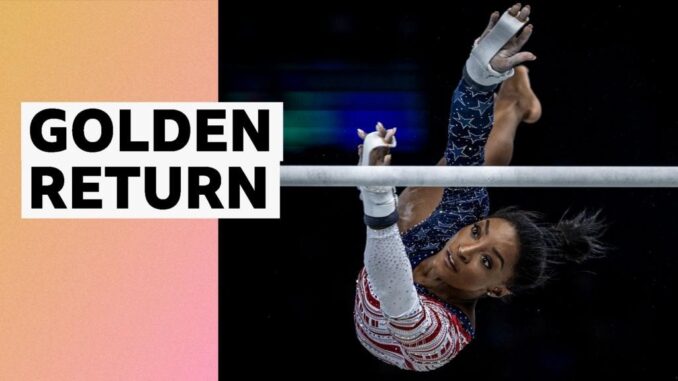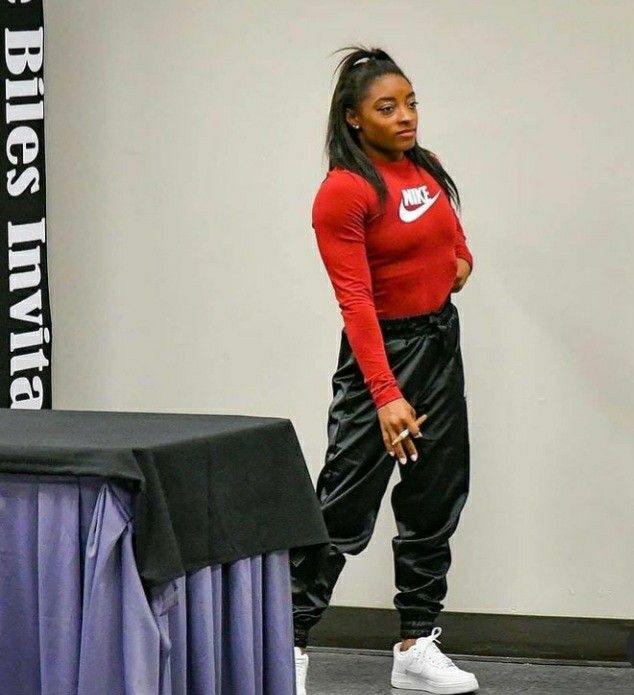
Olympic gymnast Simone Biles took a swipe at former National Collegiate Athletic Association (NCAA) swimmer and host of OutKick’s “Gaines for Girls” Riley Gaines on Sunday for her advocacy in defense of women’s sports — but an old tweet shows that Biles seemingly made the exact same argument Gaines has been making for years.
Back in 2017, Biles tweeted: “ahhhh good thing guys don’t compete against girls or he’d take all the gold medals!!” The remark came after the World Artistic Gymnastics Championships in Canada, where male gymnast Xiao Ruoteng won the men’s all-around. American female athletes like Morgan Hurd and Jade Carey took home medals in the women’s category.
You know how one tweet can — years later — blow up your credibility? That’s exactly what’s happening to Simone Biles right now. In 2025, she fired back at Riley Gaines over trans athlete inclusion in sports. But Gaines dug up a 2017 tweet from Biles that now casts a long shadow over her critique. The result? What looked like a moral high ground is now wobbling under the weight of her own words.
In this article, we’ll dig deep: What did Biles say? What did Gaines trigger? Why does that old post matter today? And how is the public reacting? Buckle up—this is more than just a sports spat.
1. Background of the Dispute
Who Is Riley Gaines?
Riley Gaines is a former NCAA swimmer and now vocal critic of transgender inclusion in women’s sports.
She tied for fifth place with Lia Thomas, a transgender swimmer, during the 2022 NCAA championships—an event she often cites in her messaging.
Since then, Gaines has gained a platform—on podcasts, media appearances, and social media—to challenge policies that allow trans women to compete in female divisions.
How the Conflict Began
The clash ignited when Gaines criticized a Minnesota high school softball team’s championship, pointing out the team had a transgender athlete. She called that player “a boy” and claimed the title was “hijacked.”
Simone Biles responded with force. She labeled Gaines “truly sick,” a “sore loser,” and called out her campaign as personal attacks rather than systemic critique.Biles also suggested the creation of a “transgender category in all sports” to keep fairness and inclusion.
Four days later, Biles issued an apology, admitting she crossed the line by making the exchange too personal.
2. The 2017 Tweet That Resurfaces
What Was the Old Post?
Gaines unearthed a tweet by Biles from October 2017. It read:
“ahhhh good thing guys don’t compete against girls or he’d take all the gold medals !!”
The context wasn’t exactly clear (the original account responded to was deactivated), but the message was straightforward: Biles acknowledged a competitive advantage men might hold in sports.
Why It Matters Now
Fast-forward to 2025, Biles is chastising Gaines for a similar stance—expressing the very inequality she once seemed to accept (or at least not publicly deny). Gaines seized the irony, asking:
“How does 2025 Simone reconcile with the fact that 2017 Simone made that statement?”
This old tweet undercuts Biles’ rhetorical posture. It raises questions: Has her view changed? Is she now contradicting her own past? Is she choosing convenience over consistency?
The “Haunting” Effect of Social Media
In the digital age, nothing evaporates. That tweet—once innocuous or forgotten—now carries weight. It’s the textbook case of “your past comes back to define your present.” And Gaines knew that. The moment she flagged it, the leverage of her criticism jumped.
One outlet put it bluntly:
“Old tweets have a way of biting you in the butt — just ask Simone Biles.”
3. The Clash of Principles: Fairness vs. Inclusion
Biles’ 2025 Stance
In her 2025 responses, Biles positioned herself as a defender of fairness and inclusion. She argued the system is flawed and that no athlete—especially minors—should be publicly targeted.
But the personal tone of her original attack drew criticism. She later conceded she should have kept it less personal.
Gaines’ Counterargument
Gaines claims that women’s spaces should be “safe” from male dominance. She insists that men don’t belong in women’s sports.When Biles later called for empathy and respect, Gaines countered by highlighting that Biles’ earlier comments struck at her personally.
Her reposting of the 2017 tweet turned the spotlight back onto Biles, forcing the gymnast to defend her consistency—or perceived lack thereof.
The Double Bind for Biles
Biles is now squeezed between two demands:
-
Consistency: Her past and present statements must align, or she faces accusations of hypocrisy.
-
Moral authority: Her critique of Gaines hinges on moral conviction. But when the moral ground is shaky, that authority weakens.
By opening this debate, she invited the excavation of her past. And now, that past actively complicates her present.
4. Public and Media Reactions
Conservative Backlash
Right-leaning media and commentators have seized on the contradiction. Some accuse Biles of hypocrisy and inconsistency. Many raise the point: why now, when she once agreed with Gaines’ underlying point?
Fox News alone ran 17 segments on the spat. Some hosts labeled Biles “mentally weak” for her apology.
Supporters’ Defense
On the other hand, many of Biles’ supporters argue:
-
People change. It’s reasonable to evolve in views.
-
Her core values—empathy, respect, protection of minors—are valid.
-
The issue is complex, and Biles never claimed to have all the answers.
Some voices in sports and journalism praised her for using her platform to defend marginalized athletes.
5. What This Feud Exposes
The Peril of Public Memory
When you are a public figure, your history isn’t private. Everything you say—even years ago—can be weaponized. The 2017 tweet is proof of that. It serves as a warning: you can’t meaningfully critique others without risk of self-exposure.
How Nuance Gets Lost in the Flames
This is no longer just about trans-athlete inclusion. It’s about consistency, authenticity, rhetorical integrity. The 2025 statements were laced with moral urgency. But once your past contradicts your present, the moral weight collapses.

Strategy vs. Sincerity
Critics will say the resurfacing tweet shows a strategic pivot to support a particular audience. Supporters might argue it’s genuine growth.
Either way, the fight is now about who gets to dictate truth—the person with the louder megaphone or the one with fewer contradictions.
Conclusion
Simone Biles’ 2017 tweet—seemingly benign at the time—has now become a fulcrum. In her 2025 clash with Riley Gaines, that old message undermines her rhetorical position, questions her consistency, and forces the public to grapple with the tension between past words and present claims.
Yes, people change. But when you choose to wade into public debates around sensitive issues, your past becomes part of the argument. For Biles, that means defending not just her criticism of Gaines—but her own identity as someone who believes in fairness, inclusion, and moral clarity.
This feud is more than a clash over sports or athletes: it’s a collision between the power of memory and the ambition of moral leadership.